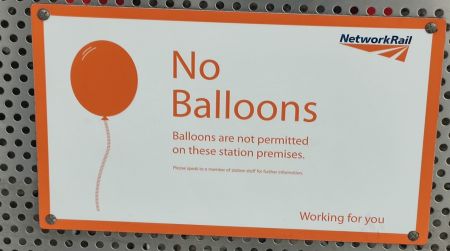No balloons
It is pleasing to imagine the sequence of events that led to the erection, of Liverpool Lime Street station, of the following sign:

|
NO BALLOONS.
Balloons are not permitted on these station premises.
Please speak to a member of station staff for further information.
- Network Rail: Working for you.
Now there are many things you can imagine that the proprietor of a rail terminus might not like brought onto its premises.
Some, its Health & Safety Executive might feel strongly about: Snakes. Crocodiles. Explosives. Undomesticated grazing livestock.
Some might upset tenants and concession-holders: a mobile coffee vendor who cycles his rickshaw in and sets up on the platform concourse: that kind of thing.
Some, while posing no immediate danger to life, limb or the profitability of stall-holders, might be disruptive to the orderly functioning of the station: protesters with megaphones. The gratuitous playing of cricket. Madrigal groups. Flash mobs. People carelessly comporting boomerangs or stink-bombs.
Yet nowhere in the grounds of Liverpool Lime Street will you be cautioned to so much as restrain your alligator. Guerrilla coffee vendors, have, as far as station signage goes, free run of the place. Choral societies, cricketers and those with loud-hailers may carry on as they please — at least, we suppose, until asked to stop. Flash mobs seem to be positively encouraged.
But should a young nipper skip across the platform with a freshly-fashioned balloon-dog, he risks the full weight of station discipline being thrown at him. True: the sign does not go on to say what form the censure would take. Would he be arrested? Marched to a cashpoint and ordered to pay an on-the-spot fine?
The JC lingered in the concourse for quite a long time, hoping to find out. But the local scallywags milling around the station — you know the type: clutching R&B 45s, earned from rough trade with itinerant American seamen[1] — seemed un-minded to run the gamut of this balloon diktat. Anyone familiar with Liverpudlian street urchins will know this to be quite out of character, and it was enough to put the JC off making formal enquiries.
So we are left with an unexplained mystery. Somehow, in Liverpool, the humble balloon has earned its own special category of turpitude. What can have happened? Was the fat controller one day plagued by balloons, flipped out and decided to get his own back? Has it helped?
If anyone knows, do write in and let us know.
A hypothesis
The JC is blessed with enthusiastic correspondents. Not many, to be true, but the ones we have are vigorous. Mr. Johnson, of Dundee, one such a fellow, writes in to point out that Network Rail frequently fulminates about balloons. Especially helium ones, which cause “dozens of train delays for passengers across Britain each year”.[2]
“While Helium-filled balloons are fun, they pose a real safety and performance risk to the railway,” said Phil James, Network Rail's North West route director. “Our advice is not let them loose outside, especially if you’re near the railway.”[3]
But a couple of observations here.
First, we imagine good old rubber balloons are harmless, inside or out. They deserve none of opprobrium Network Rail heaps on metallic ones. To our eye, the one in the illustration, looks like a normal old balloon and not a helium one. Which seems a bit mean.
Secondly, we wonder whether Network rail have properly thought this through. Either they want balloons kept inside, and not taken outside — per their press release — or they want them kept outside and not brought in — per the sign. Now, if one arrives with one’s balloon, to be confronted with the news that you cannot take it inside with you, what are you expected to do? Is not the natural response to let it go outside, QED about as near to the railway as a balloon can possibly be?
See also
{[ref}}
- ↑ This is the foundation myth of the British Invasion.
- ↑ Well, their own internal media relations team does: It does not seem to have been picked up in the national dailies.
- ↑ Emphasis added.